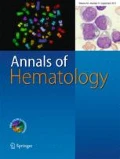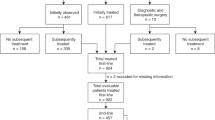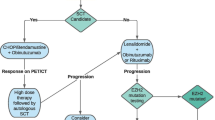Abstract
Follicular lymphoma (FL) is an indolent non-Hodgkin’s lymphoma with heterogeneous outcomes. Progression or relapse of FL within 2 years (so-called POD24) after diagnosis is associated with a poor outcome for patients treated with R-CHOP (rituximab plus cyclophosphamide, doxorubicin, vincristine, prednisone) in clinical trials. POD24 needs further validation before it can be used as a relevant endpoint to assess treatment efficacy. In the present retrospective monocentric study, we investigated the predictive value of POD24 in a cohort of grade 1, 2, or 3a FL patients treated in our institution (Nantes Medical University, France) and registered in our local database. We investigated the nature of treatment lines, patients’ outcomes, and the prognostic value of POD24. Between 2007 and 2016, 317 patients were included. After first-line therapy, 60 patients relapsed within 2 years (POD24-pos cohort), and 254 patients did not relapse within 2 years (PO24-neg cohort). Thirty-three patients died, and 34 patients had an aggressive transformation. The median follow-up is 59.9 months (1.6–395.5). The median PFS is 59.9 months. Overall survival (OS) at 1 year, 3 years, and 5 years is 98.4% [97.0–99.8], 95.1% [92.6–97.6], and 92.5% [89.3–95.9], respectively. The 5-year OS was statistically lower for POD24-pos patients (82% [71.9–93.5]) than for POD24-neg patients (93.3% [88.98–97.8]) (p = 10−5). In multivariate analyses, transformation was predictive of OS, and PS (≥ 1) was predictive of POD24. POD24 is predictive of a worse OS and may be recommended as a relevant endpoint in clinical trials and in real life in particular for patients with advanced disease.




Similar content being viewed by others
References
A clinical evaluation of the International Lymphoma Study Group classification of non-Hodgkin’s lymphoma (1997) The Non-Hodgkin’s Lymphoma Classification Project. Blood 89(11):3909–3918
Johnson PW, Rohatiner AZ, Whelan JS, Price CG, Love S, Lim J, Matthews J, Norton AJ, Amess JA, Lister TA (1995) Patterns of survival in patients with recurrent follicular lymphoma: a 20-year study from a single center. J Clin Oncol 13(1):140–147
Casulo C, Byrtek M, Dawson KL, Zhou X, Farber CM, Flowers CR et al (2015) Early relapse of follicular lymphoma after rituximab plus cyclophosphamide, doxorubicin, vincristine, and prednisone defines patients at high risk for death: an analysis from the National LymphoCare Study. J Clin Oncol 33(23):2516–2522
Swerdlow SH, Campo E, Pileri SA, Harris NL, Stein H, Siebert R et al (2016) The 2016 revision of the World Health Organization classification of lymphoid neoplasms. Blood (20):127, 2375–2190
Cheson BD, Pfistner B, Juweid ME, Gascoyne RD, Specht L, Horning SJ et al Revised response criteria for malignant lymphoma. J Clin Oncol 25(5):579–586
Oken MM, Creech RH, Tormey DC, Horton J, Davis TE, McFadden ET et al (1982) Toxicity and response criteria of the eastern cooperative oncology group. Am J Clin Oncol 5(6):649–655
Solal-Celigny P (2004) Follicular lymphoma international prognostic index. Blood 104(5):1258–1265
Federico M, Bellei M, Marcheselli L, Luminari S, Lopez-Guillermo A, Vitolo U et al (2009) Follicular lymphoma international prognostic index 2: a new prognostic index for follicular lymphoma developed by the international follicular lymphoma prognostic factor project. J Clin Oncol 27(27):4555–4562
Salles GA, Seymour JF, Feugier P, Offner F, Lopez-Guillermo A, Belada D et al (2017) Long term follow-up of the PRIMA study: half of patients receiving rituximab maintenance remain progression free at 10 Years. Blood 130(Suppl 1):486–486
Sarkozy C, Maurer MJ, Link BK, Ghesquieres H, Nicolas E, Thompson CA et al (2019) Cause of death in follicular lymphoma in the first decade of the rituximab era: a pooled analysis of French and US cohorts. J Clin Oncol 37(2):144–152
Morschhauser F, Fowler NH, Feugier P, Bouabdallah R, Tilly H, Palomba ML et al (2018) Rituximab plus lenalidomide in advanced untreated follicular lymphoma. N Engl J Med 379(10):934–947
Marcus R, Davies A, Ando K, Klapper W, Opat S, Owen C et al (2017) Obinutuzumab for the first-line treatment of follicular lymphoma. N Engl J Med 377(14):1331–1344
Bachy E, Seymour JF, Feugier P, Offner F, López-Guillermo A, Belada D, et al. (2019) Sustained progression-free survival benefit of rituximab maintenance in patients with follicular lymphoma: long-term results of the PRIMA study. J Clin Oncol JCO.19.01073
Manna M, Lee-Ying R, Davies G, Stewart C, Oh DH, Peters A, et al (2018) Autologous transplantation improves survival rates for follicular lymphoma patients who relapse within two years of chemoimmunotherapy: a multi-center retrospective analysis of consecutively treated patients in the real world. Leuk Lymphoma 1–9
Lockmer S, Østenstad B, Hagberg H, Holte H, Johansson A-S, Wahlin BE et al (2018) Chemotherapy-free initial treatment of advanced indolent lymphoma has durable effect with low toxicity: results from two nordic lymphoma group trials with more than 10 years of follow-up. J Clin Oncol 36(33):3315–3323
Maurer MJ, Bachy E, Ghesquières H, Ansell SM, Nowakowski GS, Thompson CA, Inwards DJ, Allmer C, Chassagne-Clément C, Nicolas-Virelizier E, Sebban C, Lebras L, Sarkozy C, Macon WR, Feldman AL, Syrbu SI, Traverse-Glehan A, Coiffier B, Slager SL, Weiner GJ, Witzig TE, Habermann TM, Salles G, Cerhan JR, Link BK (2016) Early event status informs subsequent outcome in newly diagnosed follicular lymphoma: early events in FL. American Journal of Hematology nov 91(11):1096–1101
Montoto S (2015) Treatment of patients with transformed lymphoma. Hematology 2015(1):625–630
Casulo C, Le-Rademacher J, Dixon J, Salles G, Hoster E, Herold M et al (2017) Validation of POD24 as a robust early clinical endpoint of poor survival in follicular lymphoma: results from the follicular lymphoma analysis of surrogacy hypothesis (FLASH) investigation using individual data from 5,453 patients on 13 clinical trials. Blood 130(Suppl 1):412
Jurinovic V, Kridel R, Staiger AM, Szczepanowski M, Horn H, Dreyling MH et al (2016) Clinicogenetic risk models predict early progression of follicular lymphoma after first-line immunochemotherapy. Blood 128(8):1112–1120
Huet S, Tesson B, Jais J-P, Feldman AL, Magnano L, Thomas E, Traverse-Glehen A, Albaud B, Carrère M, Xerri L, Ansell SM, Baseggio L, Reyes C, Tarte K, Boyault S, Haioun C, Link BK, Feugier P, Lopez-Guillermo A, Tilly H, Brice P, Hayette S, Jardin F, Offner F, Sujobert P, Gentien D, Viari A, Campo E, Cerhan JR, Salles G (2018) A gene-expression profiling score for prediction of outcome in patients with follicular lymphoma: a retrospective training and validation analysis in three international cohorts. Lancet Oncol 19(4):549–561
Delfau-Larue M-H, van der Gucht A, Dupuis J, Jais J-P, Nel I, Beldi-Ferchiou A et al (2018) Total metabolic tumor volume, circulating tumor cells, cell-free DNA: distinct prognostic value in follicular lymphoma. Blood Adv 2(7):807–816
Trotman J, Luminari S, Boussetta S, Versari A, Dupuis J, Tychyj C, Marcheselli L, Berriolo-Riedinger A, Franceschetto A, Julian A, Ricard F, Guerra L, Haioun C, Biasoli I, Tilly H, Federico M, Salles G, Meignan M (2014) Prognostic value of PET-CT after first-line therapy in patients with follicular lymphoma: a pooled analysis of central scan review in three multicentre studies. Lancet Haematol 1(1):e17–e27
Meignan M, Cottereau AS, Versari A, Chartier L, Dupuis J, Boussetta S et al (2016) Baseline metabolic tumor volume predicts outcome in high-tumor-burden follicular lymphoma: a pooled analysis of three multicenter studies. J Clin Oncol 34(30):3618–3626
Jurinovic V, Metzner B, Pfreundschuh M, Schmitz N, Wandt H, Keller U, Dreger P, Dreyling M, Hiddemann W, Unterhalt M, Hoster E, Weigert O (2018) Autologous stem cell transplantation for patients with early progression of follicular lymphoma: a follow-up study of 2 randomized trials from the German low grade lymphoma study group. Biol Blood Marrow Transplant 24(6):1172–1179
Casulo C, Friedberg JW, Ahn KW, Flowers C, DiGilio A, Smith SM, Ahmed S, Inwards D, Aljurf M, Chen AI, Choe H, Cohen J, Copelan E, Farooq U, Fenske TS, Freytes C, Gaballa S, Ganguly S, Jethava Y, Kamble RT, Kenkre VP, Lazarus H, Lazaryan A, Olsson RF, Rezvani AR, Rizzieri D, Seo S, Shah GL, Shah N, Solh M, Sureda A, William B, Cumpston A, Zelenetz AD, Link BK, Hamadani M (2018) Autologous transplantation in follicular lymphoma with early therapy failure: a National LymphoCare study and Center for International Blood and Marrow Transplant Research Analysis. Biol Blood Marrow Transplant 24(6):1163–1171
Le Gouill S, De Guibert S, Planche L, Brice P, Dupuis J, Cartron G et al (2011) Impact of the use of autologous stem cell transplantation at first relapse both in naive and previously rituximab exposed follicular lymphoma patients treated in the GELA/GOELAMS FL2000 study. Haematologica 96(8):1128–1135
Author information
Authors and Affiliations
Corresponding author
Additional information
Publisher’s note
Springer Nature remains neutral with regard to jurisdictional claims in published maps and institutional affiliations.
Rights and permissions
About this article
Cite this article
Sortais, C., Lok, A., Tessoulin, B. et al. Progression of disease within 2 years (POD24) is a clinically relevant endpoint to identify high-risk follicular lymphoma patients in real life. Ann Hematol 99, 1595–1604 (2020). https://doi.org/10.1007/s00277-020-04025-2
Received:
Accepted:
Published:
Issue Date:
DOI: https://doi.org/10.1007/s00277-020-04025-2




